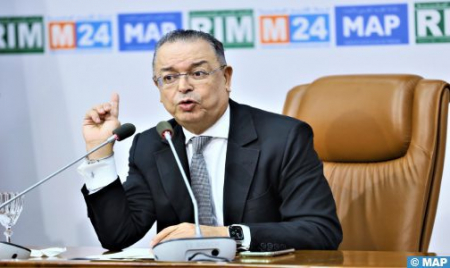EP Resolution: Lahcen Haddad Surprised by Sudden Stance Change of Some French MEPs
The chairman of the Moroccan-European Union Joint Parliamentary Committee, Lahcen Haddad, said on Tuesday in Rabat he was surprised by the sudden stance change of some French parliamentarians, which allowed the adoption, in a unilateral and irresponsible manner, of the latest resolution of the European Parliament (EP) against Morocco. “The support of the French Liberals close to the French presidency to this resolution as well as their adherence to its content and their advocacy in its favor have raised the astonishment of the Moroccan side which considered until then the French as allies,” said Haddad who was the guest of the MAP Forum, organized under the theme “Resolution of the European Parliament: Circumvention of all institutional mechanisms of dialogue and coordination and a politicization of matters that fall within the judicial domain”. Haddad, an international expert in strategic management, democracy, governance, immigration and development, explained this sudden turnaround by the fact that “part of the French deep state is annoyed by Morocco’s diplomatic and security victories and has exploited this crisis, as before the ‘fake news’ about the use of Pegasus software, to encourage French liberals to support this resolution.” He believes that it is likely that these forces have implicated Morocco in the so-called “Qatargate” affair despite the lack of evidence, ensuring that the Moroccan state will adopt an appropriate attitude to this reversal whatever its nature, whether situational or structural. “I hope that the French state is aware of the gravity of the situation. If there are parts of the state, which target Morocco through their maneuvers, it shows an irresponsibility that can lead to unfortunate consequences,” he added, calling on France to focus on transparency and clarity in its relations with Morocco, irreproachable so far in his regard. Referring to changes in the attitudes of parliamentary groups in the European Parliament, this academic, who teaches in national and international universities, noted that the centrist group in the EP was among the allies of Morocco and stood against resolutions hostile to the Kingdom, but the electoral outbidding between parliamentary groups and other accusations of corruption and attacks orchestrated by the group at the behest of Algeria have caused some to be forced to express reservations while others have given in to panic. On the other hand, the Spanish MEPs have shown courage and foresight, refusing to sacrifice the strong strategic partnership between Morocco and Spain on the altar of ill-considered positions without a future, he said, while noting dysfunctions within the Morocco-EU Joint Parliamentary Committee because of obstacles made by members acting among the European party. This approach, he said, has undermined the cooperation mechanisms established since 2008. According to him, this ill-considered resolution “has hijacked all joint actions by the Morocco-EU Joint Parliamentary Committee with our European peers,” citing by name the culprits behind the blockages, namely Antonio Panzeri and Andrea Cozzolino (former and current chairs of the committee on the European side) and their deputy Francesco Giorgi, and Marie Arena, chair of the sub-committee on rights, cited among the accused of corruption, some in detention and others sought by the Belgian justice. Noting that the adoption of this resolution without consultation with the Moroccan-EU Joint Parliamentary Committee is a “headlong rush”, Haddad said that some European counterparts in the Committee “did not want to work with the Moroccan parliamentarians. Worse, they have erected obstacles to bring to a standstill this institution of consultation, pushing the Moroccan MPs in this Committee to act individually with groups and MEPs, which has allowed the Moroccan parliamentarians to be strongly present in the EP to defend the supreme interests of the Kingdom. He considered, in this regard, that it would have been better to use this framework for consultation if the responsibilities were entrusted to people who are up to the task, calling on the European Parliament to clarify its vision about the European parties working within the Joint Parliamentary Committee. The serious work carried out by the Committee and its European allies to shed light on human rights issues in Morocco and expose the gross violations of these rights in Algeria and Tindouf has caused frustration among the enemies of Morocco’s territorial integrity, who have tried to instrumentalize the crisis of the EP, some members of which are accused of corruption. Moreover, Haddad said that the Joint Parliamentary Committee has achieved victories during a year and a half of action, since it has managed to abort all attempts to adopt or amend reports against Morocco, as well as it has contributed, through its communication and advocacy work, to raise awareness among MEPs about the seriousness of the human rights situation in Tindouf and Algeria, which has provoked the anger of the pro-Algerian lobby within the EP. He also reported the existence of centers and parliamentarians paid by Algeria in this European institution just to attack Morocco, citing in particular the members of the illegal group of support for polisario, which have no other purpose than to seek to damage Morocco’s image through the instrumentalization of the human rights issues, exploitation of natural resources and freedom of the press, among others. In this context, Haddad recalled a series of anti-Moroccan attacks in the EP in 2022, noting that parties hostile to the Kingdom have submitted no less than 112 questions targeting Morocco and tried 18 times to make amendments against its interests, knowing that 424 attempts hostile to the Kingdom have been noted since 2016. After indicating that three draft resolutions have been devoted only to the case Omar Radi in 2022, he stressed that the work of the Committee with MEPs has prevented the adoption of these texts, welcoming the efforts made by Moroccan parliamentarians in this regard.

